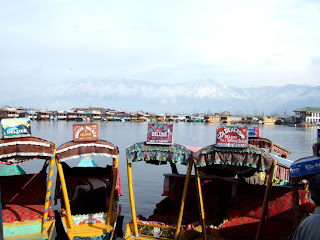

SRINAGAR in Sanskrit means a city of abundance and wealth. It is the capital of Indian Northern State of Jammu+Kashmir, lying on the bank of Jhelum River in Kashmir Valley. The city, found over 2000 years ago by King Pravara-sena II, has a long history dated back to 3th century BC. When it was part of Great Maurya Empire, Buddhism was introduced to the valley by King Ashoka but fell into the control of Hindus' Huns during 6th century. Srinagar was ruled by the law of Buddhist and Hindus until 14th century as it was then taken over by Muslim rulers and later came under the control of Mughals, whose Emperor Akbar established Mughal rules in the valley. Durrani Empire of Pashtun tribes also ruled the city for several decades before Raja Ranjit Singh annexed Srinagar and major part of Kashmir Valley into his kingdom in 1814. The city thus came under the influence of Sikhs till 1947 when it officially became one of the princely state of India. Until 2003, Srinagar was not peaceful as Indo-Pakistani war intruded the valley to capture Kashmir. Fire finally ceased seven years ago.
Srinagar composed a population of about 900,000 and 95% are Muslims. They spoke mainly Kashmiri, Hindu, Urdu and English. It is well known for its lakes and houseboats as well as its woolen products and handicrafts which are considered as one of the best in the world. Srinagar is the gateway to some of the most scenic and beautiful places in Kashmir Valley.


Dal Lake with the unique feature of Shikaras and house boats and the grandeur of its multi- faceted eco-system attracts the attention of millions of both national and international tourists to flock into Kashmir Valley to experience its distinguished beauty. "Shikara" is kind of Venetian gondola which provide ferry rides to and from banks of the lake to house boats.


Houseboats were introduced accidentally to Kashmir. Due to the suspicion of Maharaja for the presence of British. The English and members of Indian Civil Service serving in India were not permitted to have permanent houses on land when came to Kashmir for long stay vacation. As an alternative choice, they built boats and lived in it. Since the first boat named Victory, designed and built by M.T.Kenhard in 1888, there are now 500 in numbers.




Lakes in Kashmir are of great ecological and economical significance. Dal Lake stretches out to a length of 5 miles and 2 1/2 miles in width, allowing hundreds of houseboats to moor on it, and there are 5 basins and several channels which were linked to each other by water ways.


A standard boat house usually has 2 to 3 rooms but this huge boat house has 5 rooms. It was the biggest at Dal lake. In summer, you may even climb up to the top of the boat for a sun bath under a lake breeze. 1 to last last to 1



Hundreds and hundreds of houseboats lining along the edge, Dal Lake offers an exclusive opportunity for tourists to reside on the lake in an atmosphere of peace and tranquility.


Dal Lake is divided into four parts of causeway namely Gagribal, Lokut Dal, Bod Dal and Nagin.


Colorful Shikaras ferrying with people is always an outstanding feature on lake. Enjoy a tranquil Shikara ride along the pristine waters of Dal Lake once in a lifetime was more than enough then anything in the world.



As Shikara glides along the water of the peaceful lake, its gentle soothing motion was so relaxing and romantic.


Boat salesmen were very friendly and they have everything you want including the precious stone or gems which are one of the popular products in India.


It was magical to observe that while riding on Shikara along the causeway, Dal lakes changes its moods and scenery within just few km.



In summer, a 3 days water trekking along Jhelum River to various lakes in a Shikara with camping gear is most interesting.



Dal Lake, encircled by magnificent mountains on three sides, is one of the most beautiful and picturesque lake in India.


While concentration was on the houseboats, the houses and vegetation, Bod Dal and Lokut Dal suddenly appeared just like two enormous sheet of water expansion.



Dal Lake is believed to be the original Lake of Pleistocene Oligotrophic which was at one time covered entire valley of Kashmir and as per legend part of the water was drained up by the God.


The lined up houseboats, the colorful Shikara offer a serene atmosphere and picturesque surrounding to all its guests.



Farmers were ready to start their business early in the morning on the lake, though there were no much vegetables to sell in winter time.wwwwwwwww



A commercial center on the lake with rows of mechanizing shops supplying all kinds of products. What you can find on land, you can have it on lake including medicine shop and clinic.


Salesmen paddled from boat to boat selling and promoting everything you could want including of their local handicrafts, daily grocery, food and drinks and even money changing service.


Shopping in water street on the lake with Shikara ride turned out to be a wonderful life experience for all travelers.



Shops of all kinds are built of wood, floating on water and have either wood or stone stair to land into it. The shops are accessible by boats only.



Srinagar is quite a environment friendly place. Signboards of "Do not convert Heaven into Hell, Stop Pollution ..." and "Banned plastic bag" could be seen at obvious corner on lakes and at land.


Clusters of sloping roofed houses at typical farmer villages on lakes islands and large scale of floating garden.



Villagers breed goose, plant vegetables for own consumption and to our surprise they are more friendly to earth than people live in developed countries.




Dal Lake at dusk.






